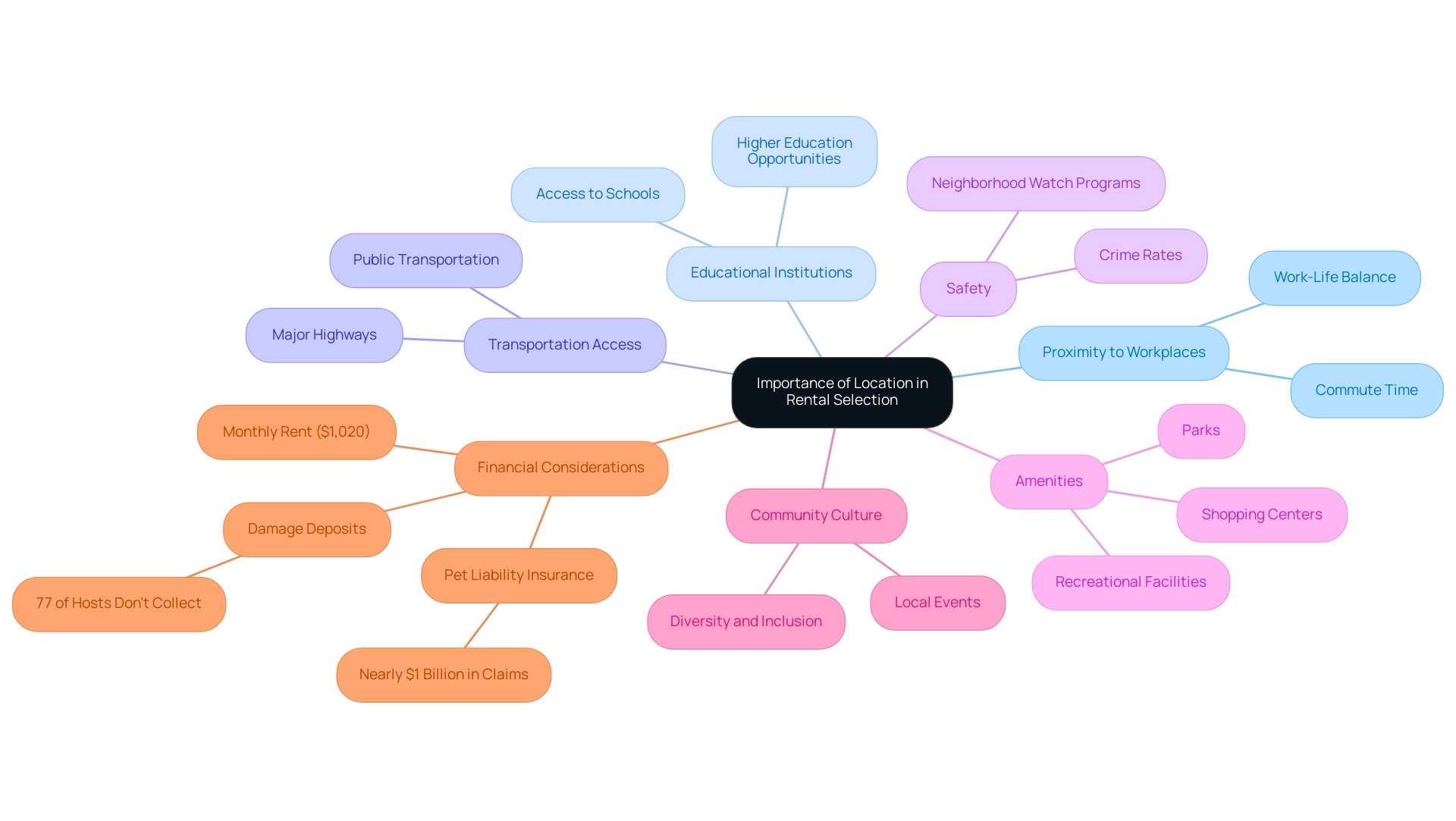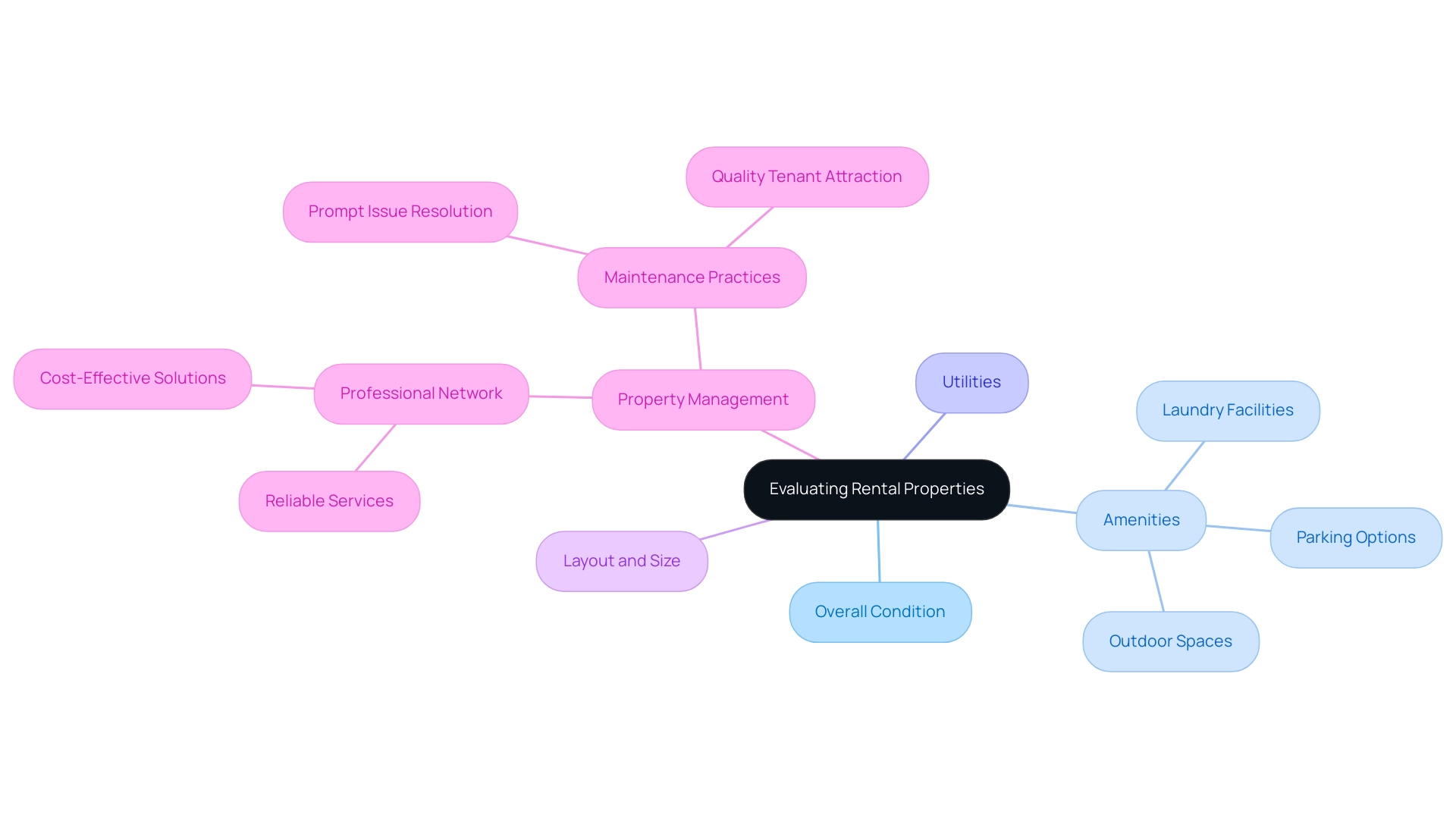Introduction
Navigating the rental market can often feel overwhelming, especially with the myriad of options and factors to consider. From selecting the right type of accommodation to understanding the nuances of rental agreements, each decision plays a crucial role in shaping the living experience. In a landscape where location, property features, and effective communication with landlords are paramount, potential renters must equip themselves with the knowledge to make informed choices. This article delves into essential strategies for evaluating rental properties, understanding costs, and fostering positive relationships with rental agencies, ensuring that individuals can confidently secure a home that meets their unique needs and enhances their quality of life.
Choosing the Right Type of Rental for Your Needs
Choosing the suitable accommodation is essential to address your specific needs effectively, particularly in a competitive market where, for example, Texas has 150,141 real estate agents competing for attention. Key factors to consider include:
- The size of the property
- Whether you prefer a furnished or unfurnished space
- The type of rental—options include:
- Apartments
- Houses
- Shared accommodations
For example, families often seek larger homes with multiple bedrooms, ensuring everyone has their own space, while individuals may lean towards smaller apartments or shared living arrangements to reduce costs.
Furthermore, assessing lifestyle requirements—such as proximity to workplaces or schools, access to public transportation, and availability of nearby amenities—can significantly streamline your search. Significantly, 77% of hosts don’t collect a damage deposit from guests, highlighting a common leasing practice that could influence your decision. Additionally, understanding projected demand for leases and vacancy rates, such as Fannie Mae's forecast that the national multifamily vacancy rate will peak at 6.25% in 2024, can provide valuable insights into market trends that affect your accommodation choices.
This thoughtful approach ensures that you select a property that aligns with your living preferences and supports your day-to-day life.
The Importance of Location in Rental Selection
The selection of site is crucial when it comes to improving your leasing experience. Factors such as proximity to workplaces, educational institutions, shopping centers, and recreational facilities can significantly shape your day-to-day life. A strategic site not only enhances the quality of life but also enables easier daily commutes, which is essential in today’s fast-paced environment.
For instance, access to public transportation is a key consideration, as it can save considerable time and alleviate commuting stress. In Paducah, KY-IL, where the average monthly rent is $1,020, understanding housing expenses is crucial for making informed choices about where to live. According to city developers, positioning is a fundamental factor of leasing satisfaction.
Moreover, as Gen Z increasingly seeks affordable housing options in less expensive neighborhoods while maintaining close access to urban amenities, the importance of location becomes even more pronounced. Safety, available amenities, and community culture should also be examined to determine if they align with your personal values and lifestyle preferences. Significantly, 77% of hosts do not collect a damage deposit from guests, which highlights financial considerations that can arise in leasing agreements.
Additionally, the insurance sector handles almost $1 billion each year in pet liability claims, emphasizing the potential risks linked with leased properties. Ultimately, investing time in researching the right location can be the decisive factor in ensuring your satisfaction with your choice, particularly in a market where prices are influenced by location dynamics.

Evaluating Rental Properties: Key Features to Consider
When evaluating leased properties, particularly in the context of lift and equipment leases, it’s crucial to focus on essential features that significantly influence the living experience. Key factors to consider include:
- The property's overall condition
- The availability of amenities such as:
- Laundry facilities
- Parking options
- Outdoor spaces
- Any utilities included in the leasing agreement
Notably, if you make at least five transactions during a statement period, you can earn a flat 250 points when paying rent through the Bilt App or Website, which can be advantageous for managing housing expenses.
Evaluating the layout and size of the space is equally important to ensure it meets your specific needs. Engaging in an in-person visit allows you to gauge the environment and ask pertinent questions about the maintenance and management practices in place. As Danielle Remley notes,
Property management companies have an extensive network of professionals and resources at their disposal
which can be invaluable in addressing maintenance issues promptly.
This network is exemplified in the case study titled 'Professional Network and Resources,' where property management companies leverage established relationships with contractors and service providers, resulting in reliable services at competitive prices. This proactive strategy not only aids in avoiding future complications but also allows you to make a well-informed leasing decision. By prioritizing these evaluations, landlords can attract quality tenants and enhance their income potential.

Understanding Rental Costs and Agreements
Before concluding a lease contract, it is essential to have a thorough comprehension of all related expenses and conditions. Begin by carefully reviewing the monthly rent, which can vary significantly across regions—like the $1,020 monthly rent in Paducah, KY-IL. Notably, the proportion of households leasing has remained constant at 34.8% between 2022 and 2023, indicating a stable leasing market.
Don't overlook the security deposit and any additional fees related to utilities or maintenance that can impact your overall budget. Understanding the specifics of the lease agreement is equally vital; pay attention to the lease duration, renewal options, and any restrictions, such as pet policies. Financial advisors suggest planning for possible unforeseen expenses, including essential repairs or hikes in utility charges, to prevent surprises later on.
For example, Eagle Pass, TX, has the lowest monthly rent at $984, followed closely by Fort Smith, AR-OK and Weirton-Steubenville, WV-OH at $1,004. This spectrum of leasing expenses highlights the significance of comprehensive budgeting. As Jacob Fabina, an economist with the U.S. Census Bureau, notes, 'The gross rent share of income did not rise nationally, which could indicate a shift in income levels among renters.'
This insight emphasizes the significance of understanding your financial obligations to prevent disputes and ensure a smoother leasing experience. By being knowledgeable and ready, you can navigate leasing contracts more effectively and manage expenses related to 40 rentals of lifts and equipment.
Effective Communication with Landlords and Rental Agencies
Effective communication with landlords and leasing agencies is essential for a successful leasing experience. To build a positive foundation, tenants should proactively engage in discussions about expectations and any potential concerns before signing a lease. Establishing a rapport can significantly enhance cooperation, making landlords more likely to respond promptly to requests or issues during the tenancy.
Regular check-ins and open discussions are essential; they not only help address maintenance needs promptly but also clarify any uncertainties in the lease. According to recent insights, a clear lease agreement creates a strong foundation for a successful landlord-tenant relationship, promoting trust and reducing misunderstandings, ultimately leading to higher tenant satisfaction. As Kelsey Heath, a real estate content specialist, notes, 'With a passion for written communication, I love helping people understand the sometimes-complicated concepts behind real estate.'
By leveraging effective communication strategies, as highlighted in the case study 'Conclusion on Tenant Relationship Management,' tenants can strengthen their relationships with landlords, ensuring a smoother and more productive rental experience.
Conclusion
Navigating the rental market requires careful consideration and a strategic approach to ensure a satisfying living experience. By selecting the right type of rental that aligns with individual needs, potential renters can better manage their living environments. Factors such as property size, furnishings, and lifestyle requirements play significant roles in this decision-making process. Moreover, understanding the importance of location cannot be overstated; it is a crucial element that influences not just rental satisfaction but also daily life.
Evaluating properties with attention to key features—such as amenities, condition, and layout—further enhances the likelihood of finding a suitable rental. Being thorough in assessing these aspects allows individuals to make informed choices that cater to their specific preferences. Additionally, grasping the intricacies of rental costs and agreements is vital for avoiding financial surprises. A comprehensive understanding of all associated expenses, including security deposits and utilities, empowers renters to budget effectively and navigate agreements with confidence.
Lastly, fostering effective communication with landlords and rental agencies is essential for a positive rental experience. Building a rapport and maintaining open lines of communication can lead to more responsive interactions and a smoother tenancy. By employing these strategic approaches, individuals can confidently secure a rental home that not only meets their needs but also enhances their overall quality of life. In a competitive market, being informed and proactive is key to transforming the challenges of renting into a successful living arrangement.
Frequently Asked Questions
Why is choosing suitable accommodation important?
Choosing suitable accommodation is essential to effectively address specific needs, especially in a competitive market with many real estate agents. It ensures that the property aligns with your living preferences and supports your day-to-day life.
What key factors should I consider when selecting accommodation?
Key factors to consider include the size of the property, whether you prefer a furnished or unfurnished space, and the type of rental, such as apartments, houses, or shared accommodations.
How does the size of the property influence accommodation choices?
Families often seek larger homes with multiple bedrooms for individual space, while individuals may prefer smaller apartments or shared living arrangements to reduce costs.
What lifestyle requirements should I assess when searching for accommodation?
Assessing lifestyle requirements includes considering proximity to workplaces or schools, access to public transportation, and the availability of nearby amenities.
How does the practice of collecting damage deposits affect leasing decisions?
Understanding that 77% of hosts do not collect a damage deposit can influence your decision-making regarding leasing arrangements.
What market trends should I be aware of when choosing accommodation?
Awareness of projected demand for leases and vacancy rates, such as the forecast that the national multifamily vacancy rate will peak at 6.25% in 2024, can provide valuable insights into market trends affecting accommodation choices.
Why is the selection of site important in the leasing experience?
The selection of site is crucial as it can improve your leasing experience by enhancing quality of life and enabling easier daily commutes, which is essential in a fast-paced environment.
What factors should I consider regarding location when choosing accommodation?
Consider factors such as proximity to workplaces, educational institutions, shopping centers, recreational facilities, safety, available amenities, and community culture to ensure they align with your personal values and lifestyle preferences.
How does the average rent in a specific area, like Paducah, KY-IL, impact my housing choices?
Understanding housing expenses, such as the average monthly rent of $1,020 in Paducah, is crucial for making informed choices about where to live.
What financial considerations should I keep in mind when leasing a property?
Financial considerations include the potential risks linked with leased properties, such as pet liability claims, and understanding common practices like damage deposits.




